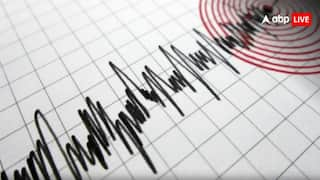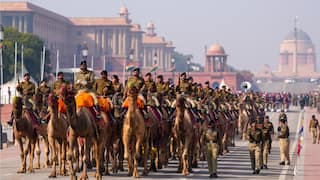US rolls out more sanctions after North Korea missile tests
Seoul, Mar 12 (AP): The US Treasury Department announced new sanctions on Friday after North Korea had tested parts of its biggest intercontinental ballistic missile in two recent launches, a sign it is likely to fire that weapon soon to put a spy satellite into orbit in what would be its most significant provocation in year.

Seoul, Mar 12 (AP): The US Treasury Department announced new sanctions on Friday after North Korea had tested parts of its biggest intercontinental ballistic missile in two recent launches, a sign it is likely to fire that weapon soon to put a spy satellite into orbit in what would be its most significant provocation in years.
The Treasury Department noted a March 4 ballistic missile launch in unveiling restrictions against three Russian-based entities that aided ongoing development of North Korea's military capabilities. The companies are Apollon, Zeel—M and RK Briz; two individuals tied to those companies will also be sanctioned.
The sanctions block access to any U.S. assets held by these companies, as well as Apollon director Aleksandr Andreyevich Gayevoy and Zeel—M director Aleksandr Aleksandrovich Chasovnikov, who also controls RK Briz.
Separately, South Korea's Defense Ministry said it detected signs that North Korea was possibly restoring some of the tunnels at its nuclear testing ground that were detonated in May 2018, weeks ahead of leader Kim Jong Un's first summit with then- President Donald Trump. The ministry didn't say whether it believes the North was restoring the site to resume tests of nuclear explosives.
North Korea's neighbours detected two ballistic launches last week. North Korea later said it was testing cameras and other systems to be installed on a spy satellite but didn't disclose what missiles or rockets it used.
After analyzing the launches, the US and South Korean militaries concluded they involved an ICBM system under development that North Korea first unveiled during a military parade in October 2020.
"The purpose of these tests, which did not demonstrate ICBM range, was likely to evaluate this new system before conducting a test at full range in the future, potentially disguised as a space launch," Pentagon press secretary John Kirby said in a statement Thursday.
South Korea released a similar assessment and said North Korea must immediately stop any act that raises tensions and regional security concerns.
The ICBM in focus is the Hwasong-17, North Korea's biggest missile, which could potentially fly up to 15,000 kilometers (9,320 miles), far enough to strike anywhere in the U.S. and beyond. The 25-meter (82-foot) missile, which was shown again at a defense exhibition in North Korea's capital, Pyongyang, last year, has yet to be test-launched.
North Korea has already demonstrated the potential to reach the U.S. mainland with flight tests of other ICBMs, the Hwasong-14 and Hwasong-15, in 2017. Some analysts say developing a larger missile could mean the country is trying to arm its long-range weapons with multiple warheads to overcome missile defense systems.
In 2018, North Korea unilaterally suspended long-range and nuclear tests before it entered now-dormant denuclearization talks with the United States. The talks collapsed in 2019 due to disputes over US-led sanctions on the North. Top North Korean officials recently hinted at lifting the 2018 weapons test moratorium.
Seoul's statement about North Korea's nuclear testing ground came after recent commercial satellite images showed a possible resumption of construction activity at the site in the northeastern town of Punggye-ri. It was used for the North's sixth and last nuclear test in 2017.
After declaring the site's closure, Kim invited foreign journalists to observe the destruction of tunnels in May 2018. But North Korea didn't invite outside experts to certify what had been destroyed. Analysts who studied the satellite images say it's unclear how long it would take for the North to restore the site for nuclear detonations.
North Korea's two missile launches were the latest in a string of tests in recent months, an apparent attempt to modernize its arsenal and pressure the Biden administration as nuclear disarmament talks remain stalled.
Observers expect North Korea to launch the Hwasong-17 missile for two main military purposes — testing key weapons parts and putting its first functioning spy satellite in space. They say North Korea may claim that it is firing a rocket, not a missile, for a satellite launch, but the U.N. and others have viewed past satellite launches as disguised tests of its long-range missile technology.
Kwon Yong Soo, a former professor at Korea National Defense University in South Korea, said the estimated thrust of the Hwasong-17 suggests it is powerful enough to place multiple reconnaissance satellites into orbit in a single launch. He said North Korea would also want to test the missile's engine parts.
Kwon said the liquid-fuelled Hwasong-17 may be too big and lack mobility given North Korea's poor road conditions. He said the launch could be a show of force, but that a spy satellite could sharply increase the North's capability to monitor the movements of U.S. aircraft carriers and other strategic assets.
"If you want to use long-range strikes on moving targets like aircraft carriers, you need to receive data on their movement from satellites," Kwon said. "If North Korea puts a spy satellite (in space), that will be an epoch-making development." Jung Chang Wook, head of the Korea Defense Study Forum think tank in Seoul, said North Korea would want to test technologies that ensure multiple warheads of a missile could survive the extreme heat and pressure of reentry from space. (AP) NSD NSD
(This story is published as part of the auto-generated syndicate wire feed. No editing has been done in the headline or the body by ABP Live.)






































